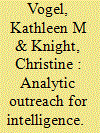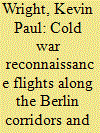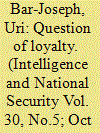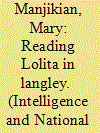| Srl | Item |
| 1 |
ID:
140496


|
|
|
|
|
| Summary/Abstract |
This article describes a new effort to engage in analytic outreach between academic scholars and intelligence analysts on the issue of emerging biotechnology threats to US national security. The context of this outreach was a September 2012 meeting in London to explore possibilities for enhanced analytic outreach in relation to emerging biotechnology threats, supported by the UK Genomics Policy and Research Forum. This meeting consisted of a mix of current and former intelligence practitioners and policy officials, and social science and scientific experts, from both the UK and the US. As will be described below, this unique pairing of experts and subjects revealed new insights into how to improve intelligence assessments on biotechnology and bioweapons threats. It also revealed continuing challenges in reforming assessments within existing intelligence work routines.
|
|
|
|
|
|
|
|
|
|
|
|
|
|
|
|
| 2 |
ID:
140491


|
|
|
|
|
| Summary/Abstract |
During the Cold War, Soviet and East German military units, equipment and activities around Berlin were high priority targets for Western military intelligence agencies. This article examines the imagery gathering undertaken by British, French and US reconnaissance flights along the Berlin Air Corridors and inside the Berlin Control Zone. The quantity of information was effectively multiplied because of the close cooperation between the Western allies and coordination with Allied Military Liaison Mission ‘ground tours’. This cooperation generally went further than has been publicly acknowledged by individual governments. This paper contends that the collaboration provided the most comprehensive and regular collection of imagery on Soviet and East German military units for the duration of the Cold War. It contributed to a multi-dimensional picture of Soviet and German Democratic Republic capabilities and intentions. Soviet motives for generally not interfering with those missions on a regular basis are considered.
|
|
|
|
|
|
|
|
|
|
|
|
|
|
|
|
| 3 |
ID:
140493


|
|
|
|
|
| Summary/Abstract |
This article applies the concepts of ‘transnationalism’ and ‘state-private networks’ to early Cold War Britain to analyze the aims and methods of governmental and non-governmental counter-subversion and propaganda in the ‘Cultural Cold War’. Using recently declassified and underutilized files, the article explores the roles of the Official Committee on Communism (Home) and, more particularly, the Foreign Office Information Research Department. The Attlee and Churchill administrations of the late 1940s and early 1950s increasingly perceived the primary non-military threat of communism to Britain as part of Soviet-inspired transnational subversion of western European societies. This created a growing impetus for a symmetrical, transnational response through both domestic and foreign clandestine ‘indoctrination’ campaigns operating via influential non-state British institutions. Despite constitutional concerns still relevant today, in 1951 ministers endorsed the domestic component of this response as a fully-fledged strategy that would encourage greater state intervention in British society in the Cold War struggle for both liberty and security.
|
|
|
|
|
|
|
|
|
|
|
|
|
|
|
|
| 4 |
ID:
140498


|
|
|
|
|
| Summary/Abstract |
Very often intelligence history concentrates on the knowledge produced by a country's intelligence service and its impact on national decision-making, or – in the case of intelligence failures – the lack thereof. Using a previously unexplored document from the archives of the French Foreign Ministry, this research note proposes another contribution of intelligence history to diplomatic history: By analysing national intelligence requirements – the ‘top secret diaries’ of governments – intelligence history can provide a window into the minds of decision-makers. The 1948 French plan de renseignement illustrates this case. Written shortly after the Cold War started in earnest in 1947, the plan de renseignement shows a French government deeply worried about the danger of global conflict and of internal upheaval in its empire, but also a government not fully committed to the western cause and particularly sceptical about American intentions. French foreign policy was at a crossroads in 1947/48 and, quite sensibly, French policy-makers wanted to know exactly what lay on all the possible roads ahead. While these findings do not contradict existing scholarship, they may help to encourage a re-weighing of existing arguments.
|
|
|
|
|
|
|
|
|
|
|
|
|
|
|
|
| 5 |
ID:
140495


|
|
|
|
|
| Summary/Abstract |
Ashraf Marwan, President Nasser's son-in-law and President Sadat's close aide, was the most important spy in the history of the Arab-Israeli conflict. However, even today, six years after his mysterious murder in London, the question of whether Marwan genuinely worked for the Israeli Mossad or misled it is at the center of a heated debate. Following a brief description of Marwan's espionage career, this article lays out the main arguments advanced by the ‘double-agent’ school, before showing them to be groundless. I conclude that Marwan had genuinely spied for Israel and was, indeed, ‘the best source the Mossad had ever had’.
|
|
|
|
|
|
|
|
|
|
|
|
|
|
|
|
| 6 |
ID:
140497


|
|
|
|
|
| Summary/Abstract |
Current methods of ascertaining the reliability of human intelligence focus predominantly on evaluating the reliability of sources. More leverage might be achieved through considering the reliability of narratives constructed or furnished by those sources. Lessons can be drawn from literary theory which examines the creation and reading of unreliable and untrustworthy narratives. A narrative can be unreliable and/or untrustworthy, even when the informant appears to be cooperating in furnishing information, due to his often unconscious biases or limitations in understanding or retelling the tale.
|
|
|
|
|
|
|
|
|
|
|
|
|
|
|
|